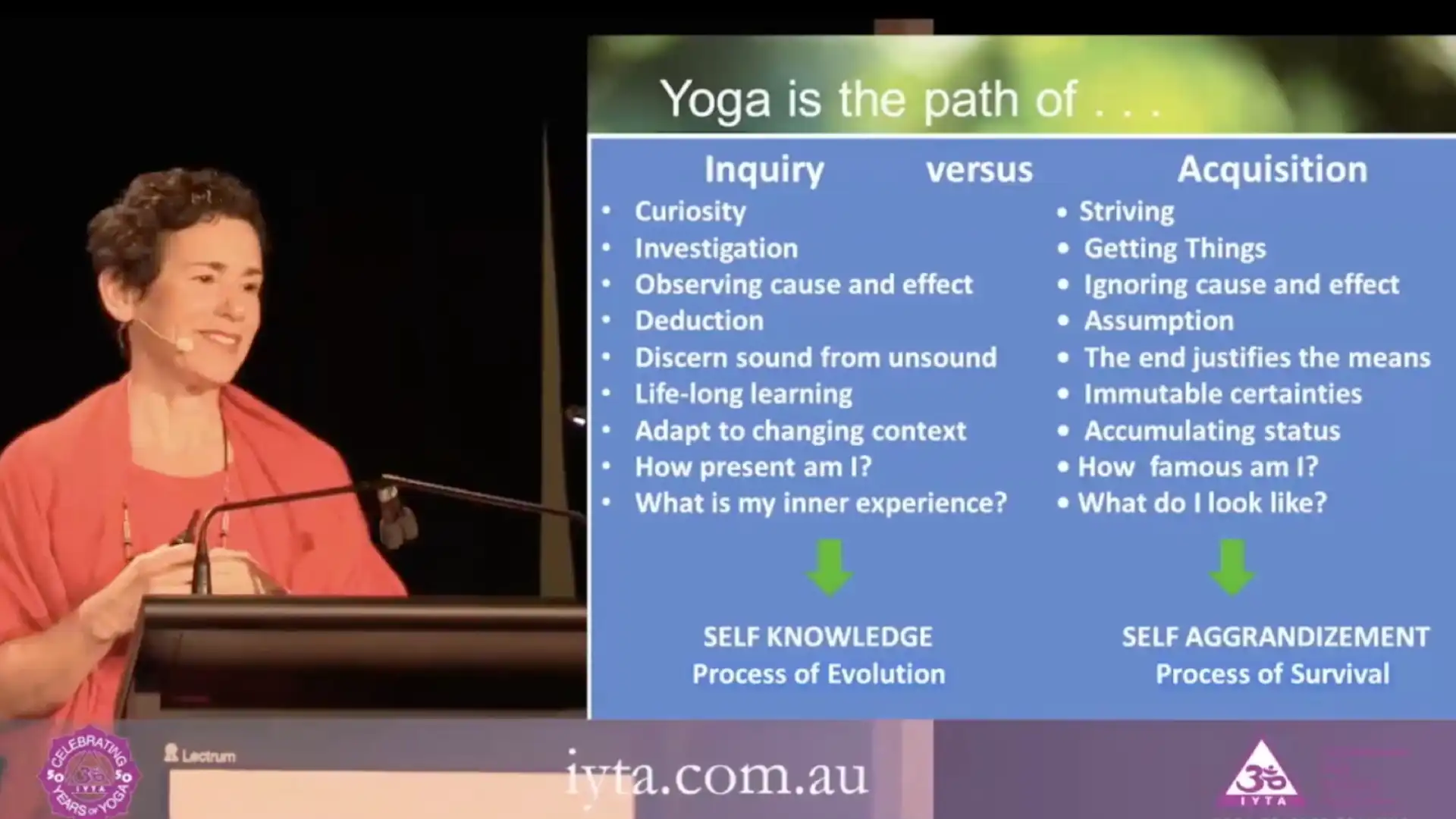Donna Farhi: What Makes Yoga . . . Yoga? – Tradition, Innovation & Evolution of Yoga Today

Enjoy this delightful keynote speech with Donna Farhi from the recent International Yoga Teaching Association 50th anniversary conference in Australia!
In the first ten minutes, Donna hilariously muses over the current state of yoga in the U.S. from goat yoga, bowspring yoga, broga yoga and so on. In the second part (around 40-minute mark), Donna strikes a more serious note, bringing up some serious considerations of relevance to all yoga practitioner. Read a brief except here, and click below to watch the whole address.
Donna Farhi – Excerpt from Traditional Innovation & Evolution in Yoga:
As many of you know, I’m not a traditionalist. I’m a maverick. All my life I’ve been questioning, investigating, exploring yoga as a path of inquiry. And I see this as central to the ability to discern between the real deal and the decoy. As I started thinking about this more and more, I felt that there are two very different paths here — the path of inquiry versus the path of acquisition.
If you’re on the path of inquiry, you are curious, you are investigating. You are observing in a scientific manner cause and effect. You are beginning to discern: what is sound? What is unsound? You are entering into life-long learning. And you’re able to learn how to adapt to a changing context. Asking the question, “How present am I?” And, “What is my inner experience?” Inquiry: to go inside. And that path leads to self-knowledge, which is a process of evolution. It’s representative of the highest aspiration I think we can have to be a human being, to have self-knowledge.
The path of acquisition, which fits in very well with our Western culture (to acquire) is about getting things – getting the foot to the back of the head. You know, I don’t really care if you can chant the Vedas, or you can get your foot to the back of your head, or whether you can blow vapor out of your bottom. I don’t really care, unless through you’re practice you’ve managed to become a decent human being. If you haven’t managed to become a decent human being, I’m not interested.
So this acquisition generally has to do with accumulating status, and it leads a very different place. We’re seeing it now, the plethora of this everywhere. It leads to self-aggrandizement, which really is a process of survival, dog eat dog. Get the first bite in. “So, the only way I can float my boat is if somebody else’s boat is lower in the water.”
Where these two paths lead is either towards community and collaboration – and this is one of the things that I love about the IYTA sangha. It embraces the value of collaboration. There are no strangers in this life. And that collaboration, that community is expressed in fostering a spirit of generosity, building equality, oneness, constructive conflict. Because there should be conflict in healthy exchange, healthy dialogue and science. We need to be able to have healthy debate. And a willingness to consider other points to view – that leads to being loving.
But if this path is taking you towards competition, is building divisiveness, is building one-upmanship, is expressing itself as living aggressively, winners and losers, “I’ve got this many Instagram followers, you’ve got this many Instagram followers,” “us and them” mentality — it’s taking us in the direction of being fearful. I know which party I want to go to.
So, one of the questions I’ve had — and I hope this question doesn’t offend anyone here because I think yoga is fundamentally about befriending yourself, knowing how to be loving towards yourself. As the One All, how could you not be loving towards the One All? Befriending others because there are no strangers anymore – there is no separation. Befriending all sentient beings. So, one of my big questions is, has traditional yoga been a path of inquiry?
Because many of the so-called modern renditions of traditional expressions and lineages of yoga give lip-service to the concept of inquiry, but this is cloaked with all kinds of conditions. You can inquire, as long as your conclusions meet those of the teacher, the method or the tradition – inquiry is permitted. When inquiry results in questioning existing understandings or challenging ideas practices, it might be discouraged or suppressed. And it’s this very archaic, pedagogic model in which there’s never a graduation ceremony for the student to become a fully individuated, thinking person, this inherently hierarchical structure that has created a breeding ground for many of the ethical transgressions and abuses of trust that have occurred in our community.



